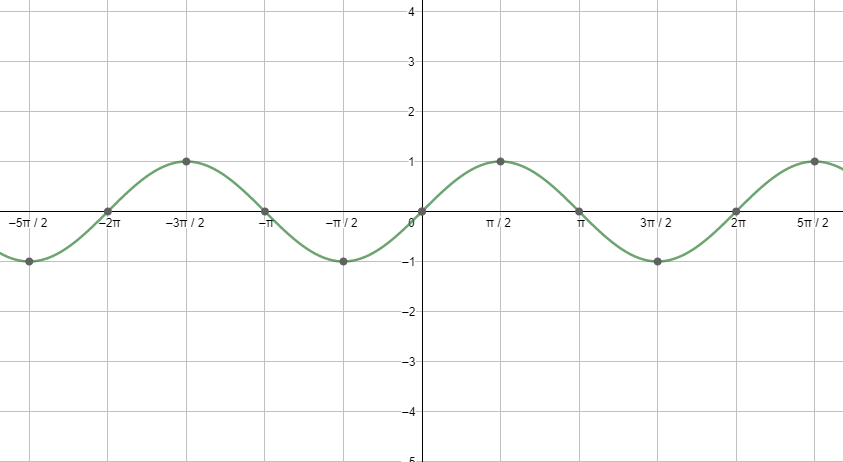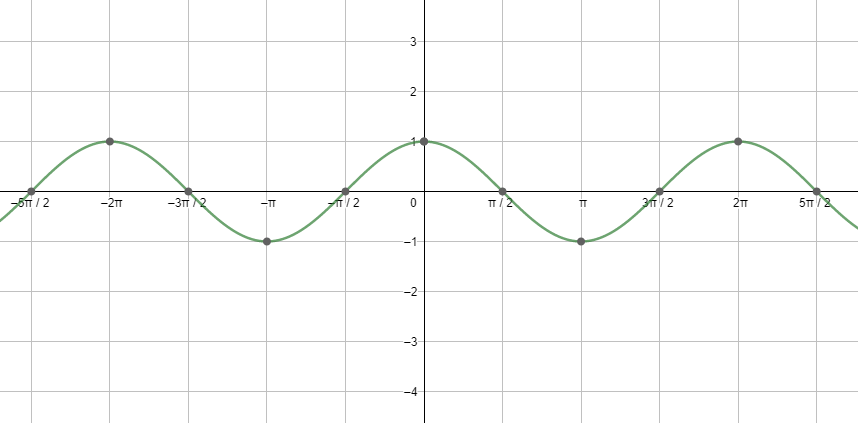
Show that: $\dfrac{1-\sin 60{}^\circ }{\cos 60{}^\circ }=\dfrac{\tan 60{}^\circ -1}{\tan 60{}^\circ +1}$ .
Answer
608.1k+ views
Hint: To solve the above question, you need to individually solve the right-hand side and left-hand side of the equation individually by putting the required values and show that both sides of the equation are equal.
Complete step-by-step answer:
Before moving to the solution, let us discuss the periodicity of sine and cosine function, which we would be using in the solution. All the trigonometric ratios, including sine and cosine, are periodic functions. We can better understand this using the graph of sine and cosine.
First, let us start with the graph of sinx.

Next, let us see the graph of cosx.

Looking at both the graphs, we can say that the graphs are repeating after a fixed period i.e. $2{{\pi }^{c}}$ . So, we can say that the fundamental period of the cosine function and the sine function is $2{{\pi }^{c}}=360{}^\circ $
Let us start the solution to the above question by simplifying the left-hand side of the equation $\dfrac{1-\sin 60{}^\circ }{\cos 60{}^\circ }=\dfrac{\tan 60{}^\circ -1}{\tan 60{}^\circ +1}$ by putting the values $\sin 60{}^\circ =\dfrac{\sqrt{3}}{2}$ and $\cos 60{}^\circ =\dfrac{1}{2}$ .
$\dfrac{1-\sin 60{}^\circ }{\cos 60{}^\circ }$
$=\dfrac{1-\dfrac{\sqrt{3}}{2}}{\dfrac{1}{2}}$
$=\dfrac{\dfrac{2-\sqrt{3}}{2}}{\dfrac{1}{2}}$
$=2-\sqrt{3}$
So, the left-hand side of the equation $\dfrac{1-\sin 60{}^\circ }{\cos 60{}^\circ }=\dfrac{\tan 60{}^\circ -1}{\tan 60{}^\circ +1}$ is equal to $2-\sqrt{3}$ .
Now let us simplify the right-hand side of the equation by putting the value $\tan 60{}^\circ =\sqrt{3}$ .
$\dfrac{\tan 60{}^\circ -1}{\tan 60{}^\circ +1}$
$=\dfrac{\sqrt{3}-1}{\sqrt{3}+1}$
Now we will multiply and divide the expression by $\sqrt{3}-1$ . On doing so, we get
$=\dfrac{\left( \sqrt{3}-1 \right)\left( \sqrt{3}-1 \right)}{\left( \sqrt{3}+1 \right)\left( \sqrt{3}-1 \right)}$
We know that $\left( a+b \right)\left( a-b \right)={{a}^{2}}-{{b}^{2}}$ . Therefore, our
expression becomes:
$\dfrac{{{\left( \sqrt{3}-1 \right)}^{2}}}{{{\left( \sqrt{3} \right)}^{2}}-1}$
$=\dfrac{{{\left( \sqrt{3}-1 \right)}^{2}}}{2}$
We also know that $\left( a-b \right)={{a}^{2}}+{{b}^{2}}-2ab$ . Therefore, our expression becomes:
$\dfrac{{{\left( \sqrt{3} \right)}^{2}}+1-2\sqrt{3}}{2}$
$=\dfrac{3+1-2\sqrt{3}}{2}$
$=\dfrac{4-2\sqrt{3}}{2}$
$=2-\sqrt{3}$
Therefore, we can say that left-hand side of the equation $\dfrac{1-\sin 60{}^\circ }{\cos 60{}^\circ }=\dfrac{\tan 60{}^\circ -1}{\tan 60{}^\circ +1}$ is equal to the right-hand side. So, we have proved that $\dfrac{1-\sin 60{}^\circ }{\cos 60{}^\circ }=\dfrac{\tan 60{}^\circ -1}{\tan 60{}^\circ +1}$ .
Note: Be careful about the calculation and the signs of the formulas you use as the signs in the formulas are very confusing and are very important for solving the problems. Also, it would help if you remember the properties related to complementary angles and trigonometric ratios.
Complete step-by-step answer:
Before moving to the solution, let us discuss the periodicity of sine and cosine function, which we would be using in the solution. All the trigonometric ratios, including sine and cosine, are periodic functions. We can better understand this using the graph of sine and cosine.
First, let us start with the graph of sinx.

Next, let us see the graph of cosx.

Looking at both the graphs, we can say that the graphs are repeating after a fixed period i.e. $2{{\pi }^{c}}$ . So, we can say that the fundamental period of the cosine function and the sine function is $2{{\pi }^{c}}=360{}^\circ $
Let us start the solution to the above question by simplifying the left-hand side of the equation $\dfrac{1-\sin 60{}^\circ }{\cos 60{}^\circ }=\dfrac{\tan 60{}^\circ -1}{\tan 60{}^\circ +1}$ by putting the values $\sin 60{}^\circ =\dfrac{\sqrt{3}}{2}$ and $\cos 60{}^\circ =\dfrac{1}{2}$ .
$\dfrac{1-\sin 60{}^\circ }{\cos 60{}^\circ }$
$=\dfrac{1-\dfrac{\sqrt{3}}{2}}{\dfrac{1}{2}}$
$=\dfrac{\dfrac{2-\sqrt{3}}{2}}{\dfrac{1}{2}}$
$=2-\sqrt{3}$
So, the left-hand side of the equation $\dfrac{1-\sin 60{}^\circ }{\cos 60{}^\circ }=\dfrac{\tan 60{}^\circ -1}{\tan 60{}^\circ +1}$ is equal to $2-\sqrt{3}$ .
Now let us simplify the right-hand side of the equation by putting the value $\tan 60{}^\circ =\sqrt{3}$ .
$\dfrac{\tan 60{}^\circ -1}{\tan 60{}^\circ +1}$
$=\dfrac{\sqrt{3}-1}{\sqrt{3}+1}$
Now we will multiply and divide the expression by $\sqrt{3}-1$ . On doing so, we get
$=\dfrac{\left( \sqrt{3}-1 \right)\left( \sqrt{3}-1 \right)}{\left( \sqrt{3}+1 \right)\left( \sqrt{3}-1 \right)}$
We know that $\left( a+b \right)\left( a-b \right)={{a}^{2}}-{{b}^{2}}$ . Therefore, our
expression becomes:
$\dfrac{{{\left( \sqrt{3}-1 \right)}^{2}}}{{{\left( \sqrt{3} \right)}^{2}}-1}$
$=\dfrac{{{\left( \sqrt{3}-1 \right)}^{2}}}{2}$
We also know that $\left( a-b \right)={{a}^{2}}+{{b}^{2}}-2ab$ . Therefore, our expression becomes:
$\dfrac{{{\left( \sqrt{3} \right)}^{2}}+1-2\sqrt{3}}{2}$
$=\dfrac{3+1-2\sqrt{3}}{2}$
$=\dfrac{4-2\sqrt{3}}{2}$
$=2-\sqrt{3}$
Therefore, we can say that left-hand side of the equation $\dfrac{1-\sin 60{}^\circ }{\cos 60{}^\circ }=\dfrac{\tan 60{}^\circ -1}{\tan 60{}^\circ +1}$ is equal to the right-hand side. So, we have proved that $\dfrac{1-\sin 60{}^\circ }{\cos 60{}^\circ }=\dfrac{\tan 60{}^\circ -1}{\tan 60{}^\circ +1}$ .
Note: Be careful about the calculation and the signs of the formulas you use as the signs in the formulas are very confusing and are very important for solving the problems. Also, it would help if you remember the properties related to complementary angles and trigonometric ratios.
Recently Updated Pages
Master Class 10 Computer Science: Engaging Questions & Answers for Success

Master Class 10 General Knowledge: Engaging Questions & Answers for Success

Master Class 10 English: Engaging Questions & Answers for Success

Master Class 10 Social Science: Engaging Questions & Answers for Success

Master Class 10 Maths: Engaging Questions & Answers for Success

Master Class 10 Science: Engaging Questions & Answers for Success

Trending doubts
What is the median of the first 10 natural numbers class 10 maths CBSE

Which women's tennis player has 24 Grand Slam singles titles?

Who is the Brand Ambassador of Incredible India?

Why is there a time difference of about 5 hours between class 10 social science CBSE

Write a letter to the principal requesting him to grant class 10 english CBSE

A moving boat is observed from the top of a 150 m high class 10 maths CBSE




